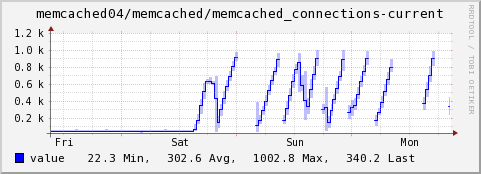[three]Bean
Async Caching & the Fedora Packages App
Feb 07, 2013 | categories: python, cache, ruby, fedora View CommentsBackstory
Luke (lmacken) Macken, John (J5) Palmieri, and Máirín (mizmo/miami) Duffy created the Fedora Packages webapp; its initial release was about this time last year at FUDCon Blacksburg. It is cool!
Over the summer, I wrote a python api and cli tool called pkgwat to query it. David Davis then wrote his own ruby bindings which now power the Is It Fedora Ruby? webapp.
In late 2012 as part of another scheme, I redirected the popular https://bugz.fedoraproject.org/$SOME_PACKAGE alias from an older app to the packages app's bug list interface.
There was a problem though: developers reported that the page didn't work and was too slow!
Darn.
Caching
There were a number of small bugs (including an ssl timeout when querying Red Hat's bugzilla instance). Once those were cleared there remained the latency issue. For packages like the kernel, our shiny webapp absolutely crawled; it would sometimes take a minute and a half for the AJAX requests to complete. We were confused -- caching had been written into the app from day one, so.. what gives?
To my surprise, I found that our app servers were being blocked from talking to our memcached servers by iptables (I'm not sure how we missed that one). Having flipped that bit, there was somewhat of an improvement, but.. we could do better.
Caching with dogpile.cache
I had read Mike Bayer's post on dogpile.cache back in Spring 2012. We had been using Beaker, so I decided to try it out. It worked! It was cool...
...and I was completely mistaken about what it did. Here is what it actually does:
- When a request for a cache item comes in and that item doesn't exist, it blocks while generating that value.
- If a second request for the same item comes in before the value has finished generating, the second request blocks and simply waits for the first request's value.
- Once the value is finished generating, it is stuffed in the cache and both the first and second threads/procs return the value "simultaneously".
- Subsequent requests for the item happily return the cached value.
- Once the expiration passes, the value remains in the cache but is now considered "stale".
- The next request will behaves the same as the very first: it will block while regenerating the value for the cache.
- Other requests that come in while the cache is being refreshed now do not block, but happily return the stale value. This is awesome. When a value becomes stale, only one thread/proc is elected to refresh the cache, all others return snappily (happily).
The above is what dogpile.cache actually does (to the best of my story-telling abilities).
In my imagination, I thought that step number vi didn't actually block. I thought that dogpile.cache would spin off a background thread to refresh the cache asynchronously and that number vi's request would return immediately. This would mean that once cache entries had been filled, the app would feel quick and responsive forever!
It did not work that way, so I submitted a patch. Now it does. :)
Threads
A programmer had a problem. He thought to himself, "I know, I'll solve it with threads!". has Now problems. two he
With dogpile.cache now behaving magically and the Fedora Packages webapp patched to take advantage of it, I deployed a new release to staging the day before FUDCon and then again to production at FUDCon on Saturday, January 19th, 2013. At this point our memcached servers promptly lost their minds.

Mike Bayer sagely warned that the approach was creepy.
Each of those threads weren't cleaning up their memcached connections properly and enough were being created that the number of concurrent connections was bringing down the cache daemon. To make it all worse, enough changes were made rapidly enough at FUDCon that isolating what caused this took some time. Other environment-wide FUDCon changes to my fedmsg system were also causing unrelated issues and I spent the following week putting out all kinds of fires in all kinds of contexts in what seemed like a never-ending rush. (New ones were started in the process too, like unearthing a PyCurl issue in python-fedora, porting the underlying mechanism to python-requests, only to encounter bundling, compatibility, and security bugs there.)
A long-running queue
During that rush, I reimplemented my async_creator.
Where before it would start up a new thread, do the work, update the cache, and release the mutex, now it would simply drop a note in a redis queue with python-retask. With that came a corresponding worker daemon that picks those tasks off the queue one at a time, does the work, refreshes the cache and releases the distributed dogpile lock before moving on to the next item.
The app seems to be working well now. Any issues? Please file them if so. I am going to take a nap.